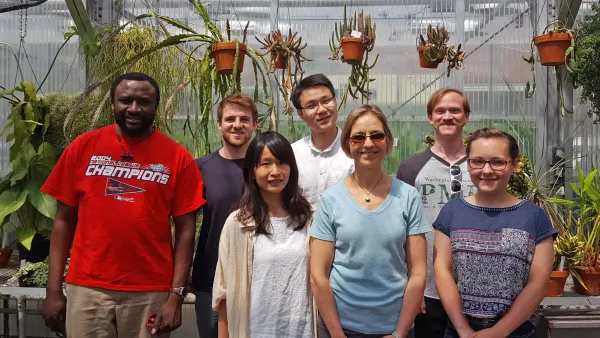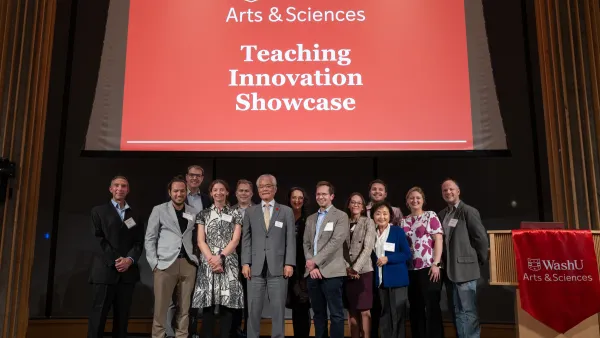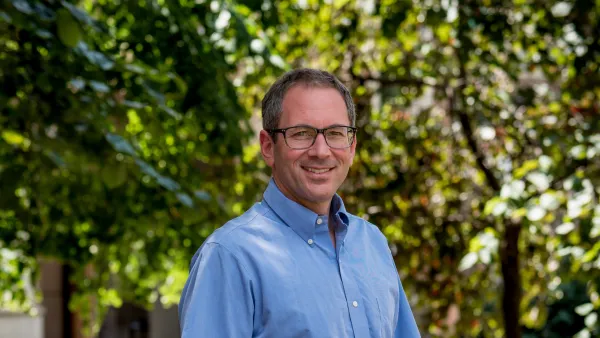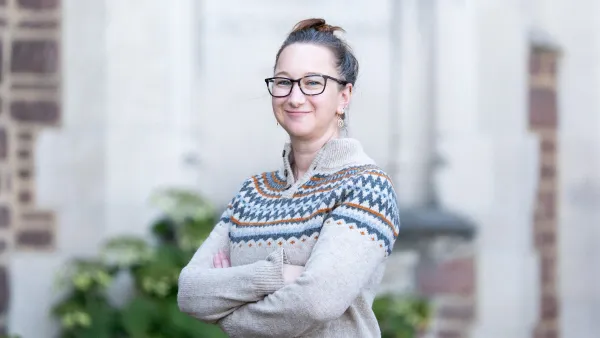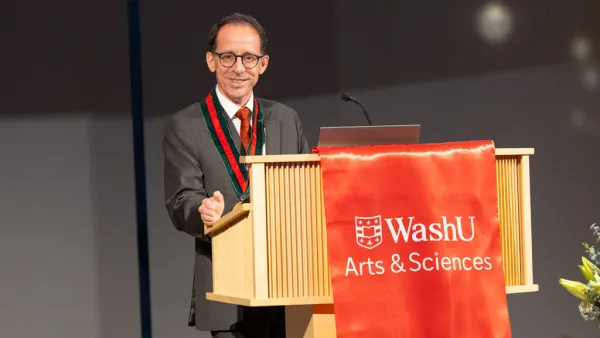Professor Barbara Kunkel studies the complex battle between plants and pathogens. As a postdoctoral trainee, she pushed the field forward in our understanding of how plants sense and respond to the presence of a pathogen. As a faculty member, she has made significant contributions to understanding the strategies plant pathogens use to manipulate their plant hosts. In addition to her research, Kunkel is an exceptional educator, one who is beloved by her students. She is a thoughtful mentor and colleague who has supported many trainees and junior faculty during her time at WashU. This year, she was awarded the AAAS fellowship in recognition of her contributions to science. She now joins 14 other AAAS fellows in the Department, including 3 women. I had a chance to talk with Barbara about what this award means to her in an inspiring interview with a woman who is doing what she loves – scientific research.
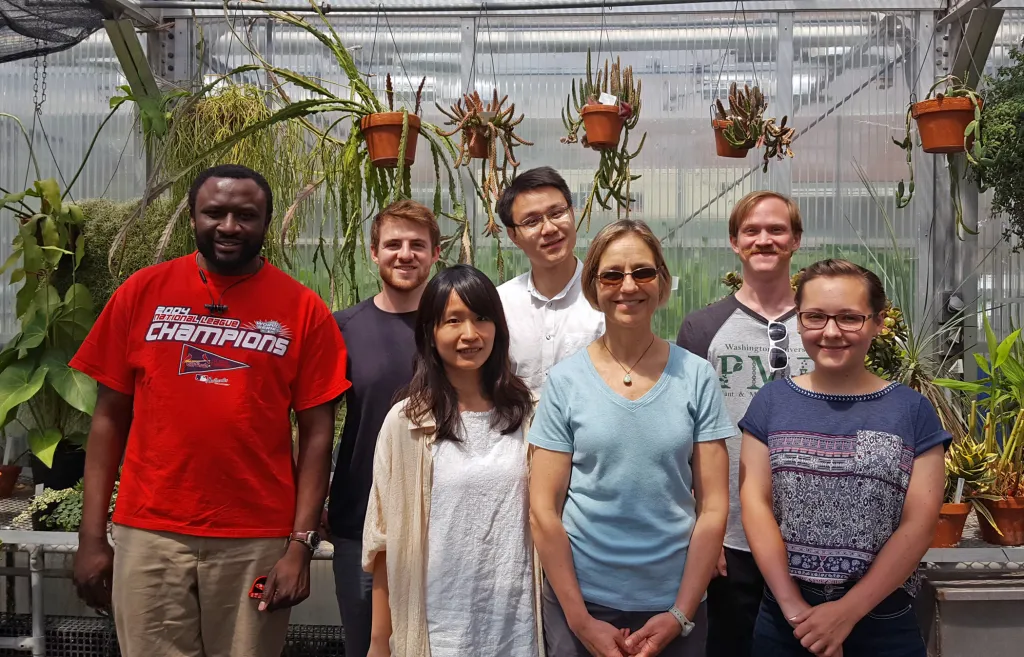
From left to right: Arnaud Tchami-Tchatchou, Josh Johnson, Cynthia Lee, Alex Li, Barbara Kunkel, Chris Harper, Sarah Guhl.
Marta: Barbara, you are a 2020 AAAS fellow. Congratulations! What does this honor mean to you – especially as a woman in science?
Barbara: I am thrilled to be joining the ranks of the other AAAS Fellows in our department, including several women. It is an honor to be recognized for the work that my students and I have done over the years.
Marta: Academia has a history of not always recognizing the contributions of women scientists. Do you agree that it is important for other women and men to promote the scientific work of female colleagues – work that deserves recognition?
Barbara: Absolutely. Bringing awareness to this need for supporting our female colleagues is important. And because of this, I am thankful that the nomination process involves fellows who are truly looking out for women to recognize and promote their work that is worthy of this honor. I'm appreciative of the scientists who nominated me to become a AAAS fellow.
Marta: I recently learned that your mother is a scientist who decided to discontinue her research after becoming a mother. You chose a different path after becoming a mother. Did your mother’s decision influence the path you chose?
Barbara: It was not my mother’s decision not to continue in science that impacted my decision; it was her advice. And you might be surprised with what I am about to say. She was constantly expressing her concerns about my wanting to become a research faculty member at an academic institution. But I realized that her advice was coming from her own experiences. My parents were both scientists – like me and my husband. But in the early 70s, they believed in the more traditional roles of the way the family was run. My father was a loving and supportive father, but he did not take on 50% of the work at home. I think my mom, from her perspective, didn't want me to be in her situation, understanding how much time and energy it took to run an academic research lab. So, she did not encourage me to pursue my plans to be a professor. However, I did pay attention to her concerns. Thus, my future husband, Michael, and I talked about how it would be possible for me to be a mother and a scientist. Actually, we discussed how both of us could be parents and research professors (he is also a biology PhD), and the plan was that my husband would take on 50%, or as close to 50%, of the child rearing.
Marta: You found your Marty [Ginsburg]!
Barbara: Ha, yes! And we had role models - very close friends who were a few years ahead of us in this whole process. We watched them because they were both scientists, and we liked how they were raising their children. We realized it can be done if Michael took on 50% of the child rearing. So that is how we handled things; we are a team, and it has worked out very well.
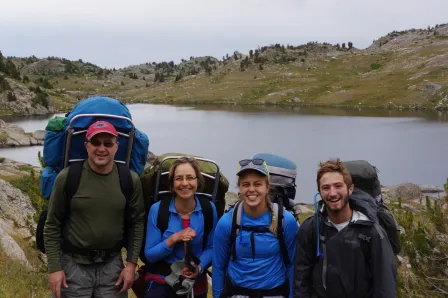
Marta: Do you think, then, that your partnership was needed to allow you to pursue your academic career?
Barbara: I do. And that is part of my advice to younger women, at least to those who want to pursue a career and have a family. Make sure you have the support outside of work to help you with your family life, to allow you to do that. Be that a willing partner or a family member, someone to take on a significant share of the child rearing and other household tasks.
Marta: What other advice do you have for young women who are starting out in their careers – be it in medicine, research, science communication, policy, etc.
Barbara: First, pursue what you love and what you are good at. There will be times when despite your hard work, you will not necessarily meet as much success as you would like. But if you love the process, you will get yourself through those times. Second, young people and women in particular say “yes” to everything they are asked to do. You have to have realistic expectations for what you can do. Start practicing saying “no” and find mentors to help you learn and practice that. Third, take some time for yourself – you will do a much better job at work, at home, and whatever else you are doing if you are healthy and happy.
Marta: What did you do for yourself?
Barbara: I would go to Jazzercise twice a week for an hour. That was my time. I was a much better balanced and happy person for it. And my husband definitely encouraged me to go. My advice would be to start building that habit early. My knees are not up for Jazzercise anymore, so now Yoga and taking long walks are essential parts of my week.
Marta: I cannot agree more. Time away from work recharges our batteries. And it seems, at least for me, I have some of my better creative moments when not at my desk in front of my computer. That seems to be what happened to you when you came up with the idea of watching “Picture A Scientist” as a department. You were talking with your family when your son mentioned wanting to discuss the film with you?
Barbara: Exactly. I was talking on the phone with my son and his girlfriend when they mentioned the film to me. I then learned that it was about several women scientists and the difficulties they faced as women in science. The film does a great job of bringing awareness to this issue, and I had the ability to help spread that awareness by helping to make it accessible to the department. Thank you for your help in arranging the screening, by the way.
Marta: Why do you think it was important for us to engage with the content of that film?
Barbara: It is important to discuss these issues so that women who have experienced discrimination and harassment realize that they are not alone. It's also important for those who haven’t had these experiences (including men) to be aware of what can happen so that in the future they can intervene. I have been extremely lucky in my career to have male mentors who always supported me. The film made me realize that these things are really happening. It was really important for me, too, because I didn't experience them myself. I am now aware of what women can be experiencing. So that I can also help fight against those things.
Marta: After the film viewing, the department hosted a discussion. You were the moderator for the event. You came to that event with your own experiences. Every person came with theirs. Was there anything that surprised you from that conversation?
Barbara: I was surprised by, and maybe surprised is the wrong word, so let me say that I was pleased to see that the younger women seem surprised that the older women had experienced discrimination. What I mean by that is that when we went around the “Zoom room”, the younger women were reporting fewer of these experiences. I was encouraged by that as it shows we have made progress. But a junior faculty member did share the discrimination she faced as a postdoc and faculty member. Therefore, we need to bring more awareness to this issue to ensure anyone who pursues this career path can do so without facing these challenges.
Marta: Thank you for sharing your thoughts with us, Barbara. You are a wonderful role model and not just for the women in the department!
Barbara: My pleasure. Thank you for the opportunity.
Learn more about Barbara Kunkel.
